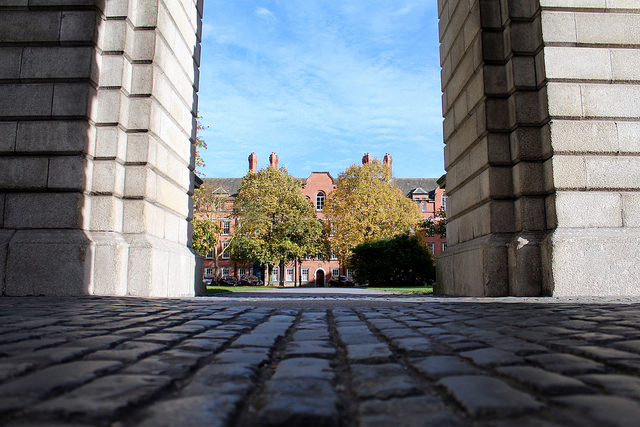When it comes to making critical College-wide decisions, Trinity rarely follows the crowd. Today’s decision on its Erasmus exchange programme has proven that.
While long-awaited, the result of the decision to be made had seemed almost predictable in the days leading up to release of today’s email, from Juliette Hussey, the vice-president for Global Relations. With a series of major universities across the country choosing to draw the curtain on exchange programmes for semester one, many Trinity students remained suspicious, if not certain, that they too would face the same fate.
Yet instead of a confirmation of their fears, future Erasmus students found an email that spawned as many questions as it answered. Erasmus is to still go ahead – albeit only if the individual host university is still willing to welcome incoming students – but the decision about whether or not to pursue it rests in the hands of students. It was a somewhat perplexing conclusion for many who had sought some clarity in the midst of disarray.
The decision to go ahead with a study abroad programme in the midst of a global pandemic is by no means a clear-cut one.
Study abroad programmes may be a lifeline for students who have found themselves confined to their homes for the past three months and for their prospective summers. While most have ended up following the same (monotonous and uneventful) routine since quarantine began, a year abroad in a foreign country offers the tantalising opportunity for a change of pace.
For language students, a chance to live amongst native speakers offers unrivalled benefits for grammar, accent and general fluency. Students are frequently reminded that a language does not just amount to its linguistic technicalities, but also its etymology, history and cultural significance.
Now, students are forced to weigh the necessity of improving their accent and fluency with the risks of moving country in a pandemic.
One must consider the reality that even if they do choose to pack their bags and take the midnight train to Berlin, life there may not live up to the wild nights they remember in the Berghain line during last summer’s interrailing trip.
Although Erasmus students are technically a member of their host university, it is quite likely that these colleges may pursue online teaching only for a large part of their time abroad. The threat of a second wave of the virus means most cannot relax in the confines of their new home without considering the likelihood that they may be sent home.
While a suspension of Erasmus would have disappointed many, all had hoped it would put an end to the lack of clarity
While most would consider the friends they make abroad to be the lasting memory they have of their time in their host country, group socialising may be a difficult task to execute when social distancing policies must be followed.
This, perhaps, is the most difficult part of the uncertainty that has bedeviled Erasmus programmes since restrictions have begun – the decision is now entirely in the hands of the students.
While a suspension of Erasmus would have disappointed many, all had hoped it would put an end to the lack of clarity on what their next few months will look like. While other universities chose to give students a concrete decision, Trinity has passed the decision back to the students – leaving them, in some ways, in the same position they started in.
Others, and I imagine this will be most, will be left with a sense of apprehension that’s fast becoming familiar
For some, the choice will be an obvious one. A year abroad outweighs the potential threats it poses, and the opportunity to experience another culture is worth the uncertainty of the return of the virus.
But others, and I imagine this will be most, will be left with a sense of apprehension that’s fast becoming familiar. With a brewing economic downturn, the threat of a second wave and the overriding fear of travel to contend with, Erasmus doesn’t quite hold the same appeal as it normally does.
Yet with potential extreme social distancing practices in Trinity taking place for the first semester, the draw to pursue studies here in Ireland also lacks allure.
Today, Trinity uncoupled itself from the responsibility of making a decision. It is now up to the individual student to consider what side of the continent they will base themselves in next year.
For many, a fixed verdict would have removed the burden of a potential ill-advised decision, diminishing a great deal of doubt in the minds of the students. But it seems that whatever each student decides, it is a fate that they, and they alone, will have to live with.







